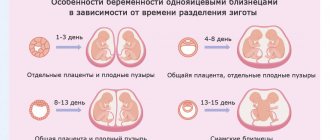Photo: UGC The 19th week of pregnancy marks approximately half the period intended for a woman by nature before the birth of her baby. By this point, the rounded belly can no longer be hidden, the parents know the sex of the unborn child, and the baby is very active inside the mother. We will tell you in the article what a pregnant woman should pay attention to at this time.
19th week of pregnancy: how the baby develops
If you are expecting a girl, then by this time her reproductive system has already formed.
She already has a vagina, uterus, fallopian tubes and ovaries, which contain more than 6 million embryonic eggs. After the baby is born, this number will be reduced to approximately 1 million. If you have a boy, then already from the 10th week of pregnancy he has developed testicles that produce testosterone. The growth of the external genitalia continues.
Around this week, the skin begins to produce a soft, waxy substance called vernix caseosa. It consists of sebum, dead cells and lanugo (fine hairs that cover the fetal body) and protects the baby's skin from the effects of being in the amniotic fluid. This lubrication mostly disappears before birth, but is common in premature babies immediately after birth.
Around the 19th week of pregnancy, the baby's sleep and wake cycles become more regular. Your baby may also begin to wake up in response to movements and sounds.
Nails begin to grow on the newly formed tips of the baby’s fingers and toes.
Hydrocephalus syndrome
As you already know, the fetal brain develops starting from the 4th week of pregnancy. It and the spinal cord are washed by cerebrospinal fluid, which is produced by the choroid plexuses. There are a number of reasons why cerebrospinal fluid can become obstructed and accumulate in the brain. This accumulation of fluid in the brain is called hydrocephalus or hydrocephalus. As a rule, 500–1500 ml of fluid is retained in the brain, but the volume can reach 5 liters. This helps to increase the size of the fetus's head, in addition, the fluid puts pressure on the brain tissue. 35% of babies with hydrocephalus come forward with their legs during birth, and in some, the head is so large that it does not pass through the birth canal, in which case a caesarean section is performed. Hydrocephalus syndrome is diagnosed in the fetus during an ultrasound scan at week 19; a routine examination will not provide information about the presence of hydrocephalus in the child. At least for this reason, you should not refuse an ultrasound scan at this time. The presence of fluid in the brain indicates a fairly severe congenital defect of the brain or spinal cord. Hydrocephalus itself, as a congenital disease, occurs no more often than in 1 case out of 2000. In some cases, fetal hydrocephalus is recommended to be treated intrauterinely.
There are 2 ways to rid your baby of excess fluid that puts pressure on the brain. One procedure involves inserting a needle through the mother's abdomen into the peri-cerebral space of the fetus and using it to pump out excess fluid that puts pressure on the brain. This procedure helps for a certain time, but subsequently the liquid may accumulate again. In the second method, a small plastic tube is inserted into the fetal brain, which remains there until birth. Excess liquid is sucked out through a tube. Both of these methods are quite risky. They are carried out only by a specialist who is sufficiently qualified and owns modern technologies.
What happens to the mother's body at 19 weeks of pregnancy
We're talking about the 19th week of pregnancy, but how many months is that? You are now five months pregnant.
At this stage, painful sensations may appear in different parts of the body due to the growing belly, and the legs also often swell. Other symptoms include dizziness, nasal congestion and back pain.
But all this more than compensates for the joy of moving or even pushing your baby, who is growing and becoming more active.
If you're lucky enough to experience bursts of energy, you can use these moments to make a list of gifts for the mother-to-be or think about what the baby will need after birth and where you will buy it.
But even if you get extra strength, don't overdo it! Try to rest and relax whenever possible.
Embryo development before IVF
With artificial conception, the gestational age is calculated not from the day of fertilization, but from the moment the IVF embryo is implanted into the uterus.
However, by the time of implantation, the embryo exists and develops for 8 days. Scientists have long studied how an IVF embryo is formed, and even took pictures of the development of the embryo on each day. For about a week of IVF, the embryo grows “in vitro”. During this period, doctors assess its viability and identify developmental abnormalities. After all, in order for pregnancy to occur, the embryo must form correctly. Actually, fertilization takes place only if the embryo has developed correctly for 8 days spent in the laboratory, without deviations. If the “wrong” embryo is formed, conception will not occur. What happens to an IVF embryo in the first days after fertilization? In the table you can see how and on what day the embryo develops.
| Day | State of the embryo |
| 0 (zero) | Doctors perform direct fertilization |
| 1 | Experts assess the presence of female and male nuclei |
| 2 | Experts evaluate the quality of the embryo by shape, fragmentation and size |
| 3 | During this period, you need to check whether the embryo includes 8 daughter cells |
| 4 | The number of daughter cells should increase to 10-16 pieces. The surface of the embryo becomes smooth |
| 5 and 6 | The embryo must develop into a blastocyst |
When the development of the “in vitro” embryo ends, the embryo is transplanted into the uterus. This is the end of the IVF stage: in order for pregnancy to occur, the embryo is implanted into the woman’s uterus. It is difficult to say on what day the embryo begins to be felt by the mother. But in the first days after IVF, you may feel slight discomfort or tingling in the abdomen. The implantation process takes on average 40 hours. But even if the doctor did everything correctly and introduced the embryo, conception may not happen. Implantation does not guarantee pregnancy; you need to wait some time to make sure that the procedure has given the desired result. But at the IVF Center clinic in Smolensk, specialists closely monitor the formation of embryos, creating the necessary temperature conditions and other important conditions that can affect the process. Therefore, our clinic has positive statistics of successfully performed IVF.
19th week of pregnancy: pregnancy symptoms
Here are some symptoms you may experience during your 19th week of pregnancy:
- Pigmentation.
Dark spots may appear on the nose, cheeks and forehead. Such spots are called “chloasma,” or “mask of pregnancy,” a common condition during pregnancy. The reason for everything is hormones. Hormones that are produced during pregnancy are also responsible for the appearance of linea nigra, a dark vertical line that runs along the abdomen from the pubis to the navel. After childbirth, chloasma and linea nigra will gradually disappear. Exposure to the sun can increase pigmentation, so be sure to apply sunscreen or try to stay in the shade.
- Pain in the round ligaments of the uterus.
As the uterus enlarges, the round ligaments that support it stretch. Sometimes the ligaments become so stretched that you may experience a sharp pain or aching sensation in the lower abdomen, usually on one side or the other. Most often this occurs when changing position or standing up suddenly. The best medicine in this case is rest. If your pain is accompanied by fever, chills, painful urination or bleeding, or if the pain is severe, call your doctor.
- Lower back pain.
Back pain is one of the most common complaints of expectant mothers, especially in the second half of pregnancy. This is due to the enlargement of the uterus and the hormonal changes that the body undergoes. The woman’s center of gravity shifts, and the back muscles, which are supposed to balance the growing uterus, become overstrained. Back pain can be relieved by stretching and strengthening exercises for the back muscles, supportive underwear, and warming up the strained muscles with a heating pad.
- Nasal congestion and nosebleeds.
Around week 19, you may find yourself needing a lot of tissues and handkerchiefs. Nasal congestion and runny nose are common. Due to the increase in the concentration of hormones in the blood, the total volume of blood also increases, which is why the nasal mucous membranes swell. This leads to nasal congestion and sometimes nosebleeds.
- Dizziness.
At this stage, you may feel lightheaded or dizzy. In this case, it is recommended to lie down and rest, and drink plenty of water.
Indications for surgery
- Uterine bleeding or menstrual dysfunction;
- Active growth of nodes (more than 4-5 weeks per year);
- Large and giant fibroids, uterine size more than 11 weeks;
- Pain syndrome;
- Submucosal, subserous nodes, atypical location;
- Development of complications: anemia, necrosis, disruption of various organs, infertility, etc.;
- Risk of malignancy.
For a written consultation, in order to choose treatment tactics in your case, you can send me a complete description of the ultrasound of the pelvic organs, indicate your age and main complaints [email protected] [email protected] Then I will be able to give a more accurate answer to your situation.
19th week of pregnancy: what to look for
- Try to move more. There are benefits from even the most moderate physical activity. Physical activity is good for both you and your baby, but try not to overdo it. A great fitness option for pregnant women is walking, swimming and even yoga or Pilates. At week 19, it is recommended to start strengthening your back muscles, and physical activity in general will help reduce stress levels. Consult your doctor - he will explain to you what types of physical activity are beneficial during pregnancy.
- A growing belly can make it difficult for an expectant mother to take her usual position to fall asleep. Beginning in the second trimester, sleeping on your back puts stress on your spine and back muscles and can put pressure on large blood vessels, causing dizziness. Try sleeping on your side with your knees bent and a pillow between your knees. You can also place a pillow under your stomach. If you suddenly wake up on your back, simply roll over onto your side. More information about sleep during pregnancy by trimester.
- Talking to other expectant mothers or parents of young children can help you feel more prepared for the upcoming event. You can find relevant groups online on social media or try to find offline parenting groups in your area.
- If you're planning a third-trimester mom-to-be party, now is the time to make a wish list! After all, it is better to send out invitations with details as early as possible, so that guests have time to prepare and buy a gift.
- Think about what you'll need for your baby and shop around or browse online so you know what specific items you like (whether for a gift list or a personal shopping list). Ask other parents for advice and read reviews. Keep in mind that not all advertised products are actually necessary for a newborn. Ask parents you know what they think you can easily do without.
Good to know
What to do about prenatal depression?
Just peace of mind! Learning to avoid stress
How to survive your wife's pregnancy (a practical guide for men)
How to deal with irritability during pregnancy
Basics of mutual understanding between a pregnant woman and her mother
Features of the use of drugs during pregnancy
All texts for pages about mother and baby were kindly provided by RAMA Publishing - these are chapters from the book by Svetlana Klaas “Your Favorite Little Man from Conception to Birth”, reviewer Irina Nikolaevna Kononova, Candidate of Medical Sciences, Associate Professor of the Department of Obstetrics and Gynecology of the Ural State Medical Academy (Ekaterinburg).








